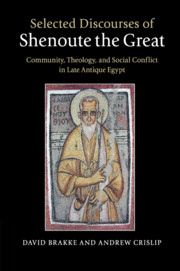 Selected Discourses of Shenoute the Great
Selected Discourses of Shenoute the Great Book contents
- Frontmatter
- Dedication
- Contents
- List of maps
- List of figures
- Acknowledgments
- Maps
- Introduction: Shenoute's life, times, and Discourses
- Part I Heretics and Other Enemies of the Church
- Part II Shenoute as Pastor and Preacher
- Part III The Christian's Struggle with Satan
- Part IV The Conflict with Gesios
- Bibliography
- Index of names
- Index of subjects
- Index of biblical passages
Introduction: Shenoute's life, times, and Discourses
Published online by Cambridge University Press: 05 December 2015
- Frontmatter
- Dedication
- Contents
- List of maps
- List of figures
- Acknowledgments
- Maps
- Introduction: Shenoute's life, times, and Discourses
- Part I Heretics and Other Enemies of the Church
- Part II Shenoute as Pastor and Preacher
- Part III The Christian's Struggle with Satan
- Part IV The Conflict with Gesios
- Bibliography
- Index of names
- Index of subjects
- Index of biblical passages
Summary
Shenoute the Great (ca. 347–465) led one of the largest Christian monastic communities in late ancient Egypt and was the greatest native writer of Coptic in history. As a monastic leader, Shenoute consolidated and directed a federation of three monasteries (two for men and one for women) in and near Atripe (in the vicinity of modern-day Sohag). The village of Atripe lay on the western side of the Nile River, across from the city of Panopolis (in Coptic, Shmin; modern-day Akhmim). Modern scholars usually refer to this community as the “White Monastery Federation” in honor of the white limestone walls of the primary monastery's church, much of which still survives. Shenoute formalized and systematized a monastic discipline that applied to both male and female monastics, and the monastery that he guided became a primary center for Christian literary culture in Egypt from late antiquity into the Arab period. His importance in the history of Egyptian monasticism rivals that of the better-known Pachomius (d. 346), founder of the famous Koinonia, after which Shenoute's community was modeled.
At the same time, Shenoute emerged as a significant – and, during his day, probably the most significant – Christian leader in the region of Panopolis. His occasional public sermons attracted crowds of clergy, monks, and lay people; officials in the government and military, and other dignitaries, called upon him and asked for his wisdom; he worked to ensure that Christians in his region would be faithful to orthodox Christian teaching as the Patriarch in Alexandria expounded it; and he vigorously, and at times violently, opposed paganism and oppressive treatment of the poor by the rich. This volume focuses on this public Shenoute by presenting in translation a selection of his sermons and other orations in which he addressed not only monks, but also clergy, lay people, visiting dignitaries, and even his pagan adversaries. Together, these works grant us access to the theology, rhetoric, moral teachings, spirituality, and social agenda of a powerful Christian leader during a period of great religious and social change in the later Roman Empire.
A biographical sketch
A Life of Shenoute survives in several versions in Coptic, Arabic, and other languages and is attributed to his successor as leader of the White Monastery, Besa.
- Type
- Chapter
- Information
- Selected Discourses of Shenoute the GreatCommunity, Theology, and Social Conflict in Late Antique Egypt, pp. 1 - 26Publisher: Cambridge University PressPrint publication year: 2015


